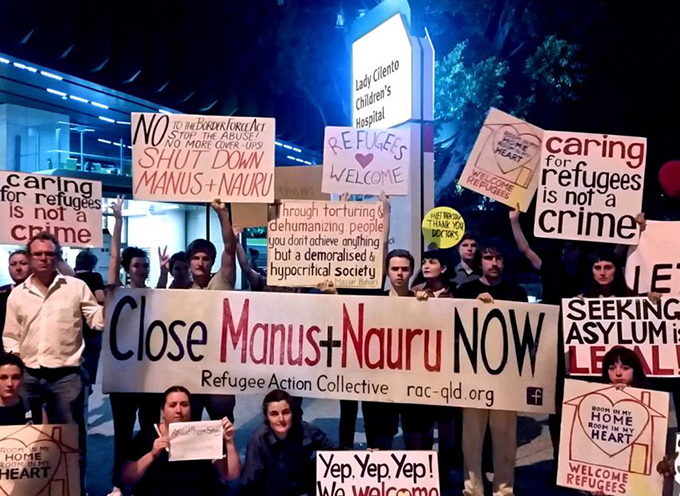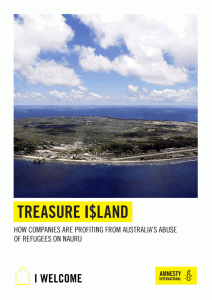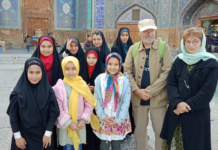
By Kendall Hutt in Auckland
Foreign companies are profiting off human rights abuses carried out at the Australian offshore refugee processing centre on Nauru, Amnesty International says.
In its new report, Treasure I$land: How companies are profiting from Australia’s abuse of refugees on Nauru, Amnesty International has detailed how Spanish multinational Ferrovial and its wholly-owned Australian subsidiary Broadspectrum have been reaping vast profits from contracts on the island nation.

Broadspectrum’s three-and-a-half-year contract, set to expire in October, is worth A$2.5 billion, which has risen from A$350 million between September 2012 and February 2014, the Amnesty International report said.
“Broadspectrum is well aware of the conditions faced on Nauru by refugees and people seeking asylum and, in some cases, its employees and sub-contractors are directly responsible for neglect and abuse.”
‘Open-air prison’
Amnesty International describes Nauru’s refugee processing centre as an “open-air prison” designed to deter some of the world’s most vulnerable people from seeking safety on Australia’s shores.
“Australia’s offshore processing system on Nauru subjects refugees and people seeking asylum to a daily diet of humiliation, neglect, abuse and poor physical and mental health care.”
It said such suffering had come in the face of Australia’s efforts to deter people from entering the country irregularly, efforts the Australian government claimed were “necessary”, Amnesty International alleged.
This “necessary” deterrence by the government and the functioning of Nauru’s offshore processing system would not be possible without Broadspectrum’s involvement.
“It is Amnesty International’s view that Broadspectrum runs the refugee processing centre (RPC) on a daily basis and has effective control over the day-to-day lives of refugees and asylum-seekers at the RPC, and that it does so on behalf of the Australian government and with the government’s ultimate oversight and control,” the report said.
Such a statement comes despite Australia’s denial it has any responsibility for refugees and people seeking asylum after it forcibly deports them to Nauru.
Human rights abuses
The human rights abuses the report has detailed include physical abuse of children, sexual assault, and the fact refugees are living in poor conditions exacerbated by the fact there is significant environmental damage due to large-scale phosphate mining.
All of this is compounded by the fact employees must adhere to strict confidentiality agreements.
It is also a criminal offence for medical and welfare professionals to speak out.
The international media itself has also been continuously barred from the island by the Nauru government.
In light of the report’s findings, Amnesty International has also issued a stern warning for those thinking of picking up Broadspectrum’s contract and says it is putting them on notice.
“You will be complicit in an intentionally and inherently abusive and cruel system, you will be acting in direct contravention of your human rights responsibilities and you will be exposing yourself to potential legal liability.”
End ‘indefinite limbo’
Speaking to Asia Pacific Report from Brisbane, Kate Schuetze, a Pacific researcher and policy adviser with Amnesty International for the Pacific, Australia and New Zealand, said Broadspectrum needed to end the “indefinite limbo” in Nauru as soon as possible before October and withdraw its services.
She said Amnesty International had “consistently called for Nauru to be closed” and “alternative arrangements” made for the some 1000 refugees on the island.
Amnesty International said the government of Australia needed to end its policy of offshore processing and detention and permanently close its centres on Nauru and Manus Island.
“It should change its policy” Schuetze said.
She said the report should “serve as a warning” for anyone else considering taking over Broadspectrum’s contract.
Broadspectrum, however, has denied all allegations by Amnesty International that it has committed human rights abuses.
“Broadspectrum does not agree with the multiple assertions that we have caused, contributed to, or are complicit in, human rights abuses.
“The care and wellbeing of asylum seekers and refugees is paramount in our processes and actions,” Broadspectrum said.
- Treasure I$land — the full Amnesty International report on Nauru
- Oppressive culture of secrecy












































